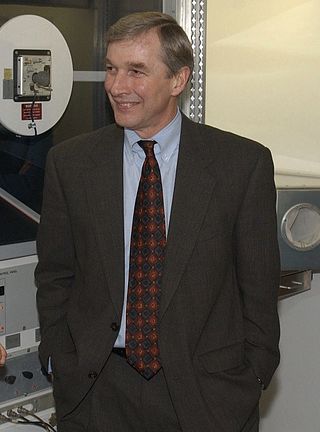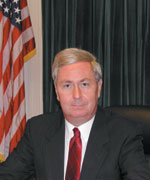
Ottawa County is a county located in the U.S. state of Michigan. As of the United States 2020 Census,the population was 296,200. The county seat is Grand Haven. The county is named for the Ottawa Nation. It was set off in 1831 and organized in 1837. Ottawa County is included in the Grand Rapids-Kentwood,MI Metropolitan Statistical Area and has a significant Dutch American population.

Kent County is located in the U.S. state of Michigan. As of the 2020 Census,the county had a population of 657,974,making it the fourth most populous county in Michigan,and the largest outside of the Detroit area. Its county seat is Grand Rapids. The county was set off in 1831,and organized in 1836. It is named for New York jurist and legal scholar James Kent,who represented the Michigan Territory in its dispute with Ohio over the Toledo Strip.

Richard Posthumus is an American businessman,and politician. He was the 61st lieutenant governor of Michigan and majority leader of the Michigan Senate. In 2002,he was the unsuccessful Republican nominee for Governor of Michigan.

The Michigan House of Representatives is the lower house of the Michigan Legislature. There are 110 members,each of whom is elected from constituencies having approximately 77,000 to 91,000 residents,based on population figures from the 2020 U.S. census. Its composition,powers and duties are established in Article IV of the Michigan Constitution.

James Allan Barcia is an American Democratic politician from Michigan. He has served successively in the Michigan House of Representatives,the Michigan Senate,the United States House of Representatives and then again the Michigan Senate,from which he was term-limited in January 2011. He has served as County Executive of Bay County,Michigan,since January,2017.

The Michigan Democratic Party is the affiliate of the Democratic Party in the state of Michigan. It is based in Lansing. Lavora Barnes is the party's current chair. She was previously the party's Chief Operating Officer. It is currently the state's dominant party,controlling the majority of Michigan's U.S. House seats,both U.S. Senate seats,both houses of the state legislature,and the governorship.
Roy Schmidt is an American former politician. He served several terms as a member of the Grand Rapids,Michigan City Commission,and two terms as a member of the Michigan House of Representatives representing the 76th district,which includes part of the Grand Rapids metropolitan area. He retired from politics after losing re-election following a change of parties and controversial campaign activities.

Patrick A. Miles Jr. is an American lawyer. He was the former U.S. Attorney for the Western District of Michigan based in Grand Rapids,Michigan. He was nominated by President Obama on March 29,2012,and confirmed by the U.S. Senate on June 29,2012. Miles is the first person of color to hold the position of U.S. Attorney for the Western District of Michigan,which covers 49 Michigan counties including the state's entire Upper Peninsula.

James "Jase" Bolger served as the 71st Speaker of the Michigan House of Representatives from January 12,2011 to the end of 2014 session. Bolger is a member of the Republican Party,and represented Michigan's 63rd house district from 2009 to 2014. After being term limited out,he founded a consulting firm,Tusker Strategies. Bolger was also appointed by former Governor Rick Snyder on December 29,2016 to the Michigan Civil Service Commission and was elected chair on April 27,2023.
Steven Pestka is an American politician,attorney and businessman. Pestka served as a member of the Michigan House of Representatives,judge,and a Kent County commissioner. He was the Democratic Party nominee for the United States House of Representatives 2012 election to represent Michigan's 3rd congressional district,which he lost to Justin Amash.

The 2014 Michigan House of Representatives elections were held on November 4,2014,with partisan primaries to select the parties' nominees in the various districts on August 5,2014. Members elected at the 2014 election served in the 98th Michigan Legislature which convened on January 7,2015.

Brandon Dillon is an American politician. He is the former Chair of the Michigan Democratic Party.
Jon Hoadley is an American politician from Michigan. A member of the Democratic Party,Hoadley has represented the 60th district—which includes the entire City of Kalamazoo and the majority of Kalamazoo Township—in the Michigan House of Representatives since first winning election in November 2014.
Larry Charles Inman is an American politician in the Republican Party who formerly represented the 104th District—which includes Grand Traverse County—in the Michigan House of Representatives after being elected in November 2014.
Chris Afendoulis is a former Republican Member of the Michigan House of Representatives,he was first elected in 2014 and represented the 73rd District from 2015 to 2019,he was succeeded by his cousin Lynn Afendoulis.
Tommy Brann is an American politician from Michigan. Brann is a Republican member of Michigan House of Representatives from District 77.
Mark E. Huizenga is a Republican member of the Michigan Senate for the 30th district.
Kevin J. Green is a Michigan politician.
John Wesley Fitzgerald is an American politician currently serving his first term in the Michigan State House of Representatives for the 83rd District. Fitzgerald won his race on November 8,2022,against Lisa DeKryger. Fitzgerald lives in Wyoming,Michigan with his wife and daughter.
Kent Vanderwood is an American politician who is the mayor of Wyoming,Michigan,previously serving as a city council member for four terms from 2006 to 2022. In July 2023 he was charged for his participation in the Trump fake electors plot during the 2020 United States presidential election. As a result,calls for his recall or resignation were advanced. As of 2023,Mayor Vanderwood has said he will not resign.









